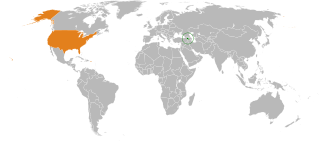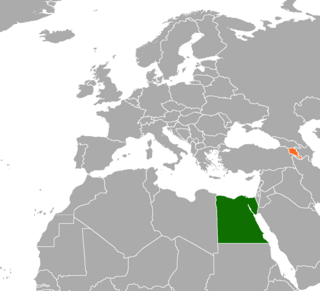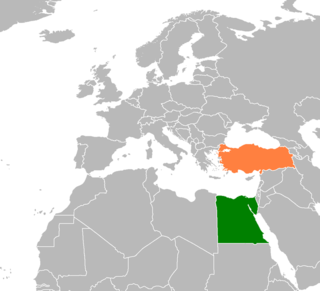
Since its independence, Armenia has maintained a policy of trying to have positive and friendly relations with Iran, Russia, and the West, including the United States and the European Union. It has full membership status in a number of international organizations, such as the Council of Europe and the Eurasian Economic Union, and observer status, etc. in some others. However, the dispute over the Armenian genocide of 1915 and the ongoing Nagorno-Karabakh conflict have created tense relations with two of its immediate neighbors, Azerbaijan and Turkey.

The Armenian Revolutionary Federation, also known as Dashnaktsutyun, is an Armenian nationalist and socialist political party founded in 1890 in Tiflis, Russian Empire by Christapor Mikaelian, Stepan Zorian, and Simon Zavarian. As of 2023, the party operates in Armenia, Lebanon, Iran and in countries where the Armenian diaspora is present. The party was also active in Artsakh until the Azerbaijani offensive in September 2023. Although it has long been the most influential political party in the Armenian diaspora, it has a comparatively smaller proportional presence in modern-day Armenia. As of October 2023, the party was represented in two national parliaments, with ten seats in the National Assembly of Armenia and three seats in the Parliament of Lebanon as part of the March 8 Alliance.

Relations between Armenia and France have existed since the French and the Armenians established contact in the Armenian Kingdom of Cilicia in the 12th century. Formal diplomatic relations between Armenia and France were established on 24 February 1992. Due to the good relations between the two countries, 2006 was proclaimed the Year of Armenia in France.

Armenian genocide recognition is the formal acceptance that the systematic massacres and forced deportation of Armenians committed by the Ottoman Empire from 1915 to 1923, during and after the First World War, constituted genocide.

Relations between Armenia and Germany, have always been stable and solid, with both countries continuing to work together and advance through the years in cooperation. Both countries' leaders have discussed bilateral relations and noted that they have considerably improved over the last few years.

The dissolution of the Soviet Union in December 1991 brought an end to the Cold War and created an opportunity for establishing bilateral relations between the United States with Armenia and other post-Soviet states as they began a political and economic transformation. The United States recognized the independence of Armenia on 25 December 1991, and opened an embassy in Armenia's capital Yerevan in February 1992.

Foreign relations exist between Armenia and the United Kingdom. The United Kingdom recognised Armenia on 31 December 1991. The first Embassy of Armenia in Europe was established in London in October 1992; in 1995 the United Kingdom established an embassy in Yerevan. The two countries maintain collaborative and friendly relations.

Foreign relations exist between Armenia and Egypt. Egypt was one of the first countries in the Arab world which recognized the independent Armenia in 1991. In March 1992, the diplomatic relations were established between the two countries. In May 1992, the first diplomatic mission of Armenia in the Arab East was inaugurated in Cairo. Egypt has an embassy in Yerevan.

The Armenian community in Argentina is the largest in Latin America totaling approximately 120,000 members.

Egypt and Turkey are bound by strong religious, cultural and historical ties, but diplomatic ties between the two have remained extremely friendly at times and extremely strained at others. For three centuries, Egypt was part of the Ottoman Empire, whose capital was Istanbul in modern-day Turkey, despite governor of Egypt, Muhammad Ali, waged war against the Ottoman sultan, Mahmud II, in 1831.

Current and historical relations exist between Armenia and Denmark. Armenia has an embassy in Copenhagen, and Denmark is represented in Armenia, through its embassy in Kyiv, Ukraine. Diplomatic relations were established on 14 January 1992. The current Armenian Ambassador to Denmark is Hrachya Aghajanyan. In 2008, the Armenian Foreign Minister Eduard Nalbandyan called the relations between Armenia and Denmark "friendly" and "highly appreciating". In 2013 Amstream was founded as an independent non-political and non-profit organization in order to initiate means of collaboration and partnerships between Armenia and Scandinavia within business, education and culture. Both countries are members of the Council of Europe.

Bilateral relations exist between Armenia and Serbia. Diplomatic relations between Armenia and the Federal Republic of Yugoslavia were established on 14 January 1993; Serbia is the legal successor to this country. Both countries are represented through their embassies in Athens, Greece, and both have established honorary consulates, which serve as the only diplomatic representatives between the two countries.

Canadian–Turkish relations are foreign relations between Canada and Turkey. Both countries are members of the G20, NATO, Organization for Economic Co-operation and Development, Organization for Security and Co-operation in Europe, United Nations and the World Trade Organization.

Lebanon–Turkey are the bilateral relations between Lebanon and Turkey. Lebanon has an embassy in Ankara and a consulate general in Istanbul. Turkey has an embassy in Beirut. The two nations are connected through history as Lebanon gained independence from the Ottoman Empire. Both countries are members of the Union for the Mediterranean and Organisation of Islamic Cooperation.

The Armenian Revolutionary Federation, also known simply as Tashnag, is an Armenian political party active in Lebanon since the 1920s as an official political party in the country after having started with small student cells in the late 1890s and early 20th century.

Armenian–Syrian relations are foreign relations between Armenia and Syria. Armenia has an embassy in Damascus and a consulate general in Aleppo. In 1997, Syria opened an embassy in Yerevan. Syrian Foreign Minister Farouk al-Sharaa visited Armenia in March 1992.

Foreign relations have reportedly always been strong between Armenia and Cyprus. Cyprus has been a supporter of Armenia in its struggle for the recognition of the Armenian genocide, economic stability and the resolution to the Nagorno-Karabakh conflict. In return Armenia has been advocating a stable Cyprus after the Turkish invasion in 1974 and supporting a lasting solution to the Cyprus dispute.
The following lists events that happened in 2006 in Armenia.

Relations between Armenia and Brazil, have existed for decades. The Armenian community in Brazil is the second largest in Latin America totaling approximately 100,000 members.

Diplomatic relations between Armenia and Saudi Arabia were formalized on 25 November 2023. However, the relationship between the two countries has witnessed significant warming since the 2010s, possibly due to common opposition to increasing Turkish influence.




















